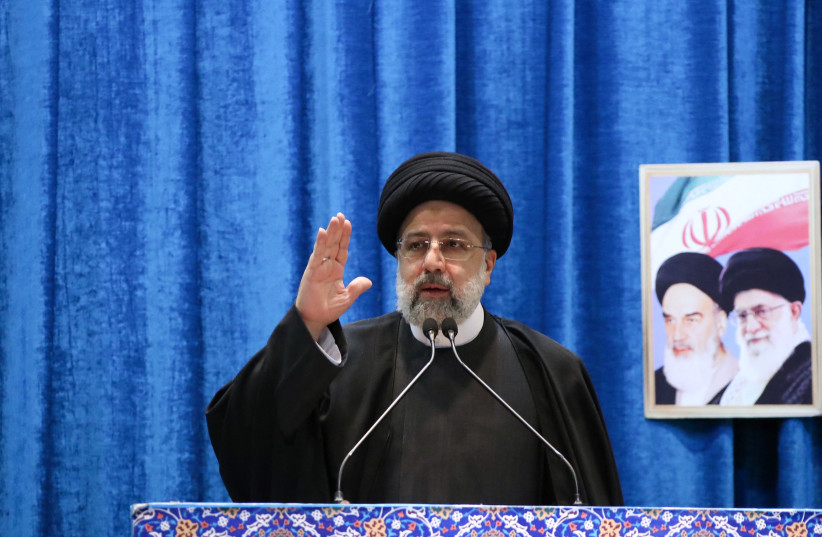“We have made significant progress, we are close to a possible deal, but we’re not there yet,” said State Department Spokesperson Ned Price.
By OMRI NAHMIAS Published: MARCH 17, 2022 08:55
Iranian President Ebrahim Raisi gestures as he speaks at Tehran’s Friday prayer on the occasion of the 43rd anniversary of the Islamic Revolution of Iran in Tehran, Iran, February 11, 2022. (photo credit: PRESIDENT WEBSITE/WANA (WEST ASIA NEWS AGENCY)/HANDOUT VIA REUTERS)
WASHINGTON – The US believes that a possible deal with Iran is close, State Department Spokesperson Ned Price said on Wednesday. “We do think the remaining issues can be bridged,” Price said in a press briefing. “We have made significant progress, we are close to a possible deal, but we’re not there yet.”
He noted that there is little time remaining to reach such a deal, “given the nuclear advancements that Tehran has made, that over time would obviate the non-proliferation benefits that the JCPOA conveyed.”
“This is an issue that needs to be worked on urgently,” he added. “We still continue to believe that a mutual return to compliance would be manifestly in our interests, and we are going to find out in the near term whether we’re able to get there.”
Price was also asked about a report in Axios, according to which the administration is considering removing the IRGC from the FTO list in return for a public commitment from Iran to de-escalate in the region.
“It’s not something I can speak to beyond the fact that there are two key issues at the heart of these negotiations,” said Price.
US State Department spokesperson Ned Price speaks during a news conference in Washington, US March 10, 2022. (credit: MANUEL BALCE CENETA/POOL VIA REUTERS)
US State Department spokesperson Ned Price speaks during a news conference in Washington, US March 10, 2022. (credit: MANUEL BALCE CENETA/POOL VIA REUTERS)
“On the one hand, you have the nuclear commitments that Tehran would need to adhere to resume full compliance with the JCPOA.
“On the other side of the ledger, you have the sanctions relief that the United States, working with our P5+1 partners, would be prepared to provide if we were to achieve a mutual return to compliance with the JCPOA. So the issue of sanctions relief is real and has been at the heart of these negotiations, but we’re just not going to speak to specifics at this stage.”
He also addressed a question about whether the US would submit the agreement for a congressional review and wait out the 30-day period before lifting sanctions. “We will carefully consider the facts and circumstances of any US return to the JCPOA to determine the legal implications, including those under INARA [The Iran Nuclear Agreement Review Act]. We’re committed to ensuring the requirements of INARA are fully satisfied,” he said.
He went on to say that President Biden believes that “a bipartisan approach across our foreign policy, including to Iran, is the strongest way to safeguard US interests in the long term.”
“We don’t have a deal, this is a hypothetical, but if and when there is any sort of agreement, we are committed to ensuring the requirements of INARA are fully satisfied,” he added.
In recent weeks, Congress Republicans urged the administration to share the details of the agreements for review – and some suggested it should be ratified as a treaty by two-thirds of the Senate.
Earlier this week, a group of 49 Republican Senators – all but Kentucky Sen. Rand Paul – announced that they will not support efforts to revive the 2015 nuclear agreement with Iran.
“We strongly urge the administration, our Democrat colleagues, and the international community to learn the lessons of the very recent past,” they wrote. “A major agreement that does not have strong bipartisan support in Congress will not survive.
Last week, a bipartisan group of 21 lawmakers sent a letter to Biden expressing concern over a potential nuclear agreement with Iran.
“Among other issues, we are highly concerned about reports indicating the potential lifting of the Foreign Terrorist Organization designation of the Islamic Revolutionary Guard Corps and of the sanctions placed on members of the office of the supreme leader,” they wrote.
https://www.jpost.com/international/article-701557
Content retrieved from: https://www.jpost.com/international/article-701557.
